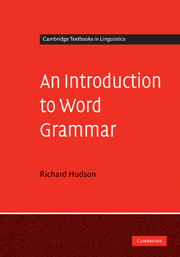6 - Words as concepts
Published online by Cambridge University Press: 05 June 2012
Summary
Types and tokens
Summary of Section 2.1:
• Knowledge, or conceptual structure, consists of concepts (e.g. ‘bird’) and their properties (e.g. ‘it flies’).
• Exemplars are specific concepts which are tied to particular experiences (e.g. ‘that bird over there’).
• Categories are general concepts. We use them to categorize (i.e. to classify) exemplars.
• Once we have categorized an exemplar, it can inherit the properties of the category (e.g. ‘that bird over there’ can inherit ‘it flies’). This is how we use past experience to guide us through the present and predict the future.
The question for this section is how the ideas from Section 2.1 apply to language. Which parts of language are concepts, and how does the contrast between exemplars and categories apply in language?
Language as concepts
Linguists often assume that the only point of contact between conceptual structure and language is in meaning, where words act as the names for concepts such as ‘dog’. One influential theory of meaning even uses the term ‘conceptual structure’ for meaning (Jun 2006), implying that nothing else in language is part of conceptual structure. For the historical reasons that I explained in Chapter 5, most theories of language structure recognize even less connection between language and conceptual structure, with language and conceptual structure co-existing in some undefined way.
In contrast, cognitive linguistics insists that conceptual structure includes the whole of language: not only meanings, but also words, word-parts, sentence structures and even sounds.
- Type
- Chapter
- Information
- An Introduction to Word Grammar , pp. 109 - 144Publisher: Cambridge University PressPrint publication year: 2010

